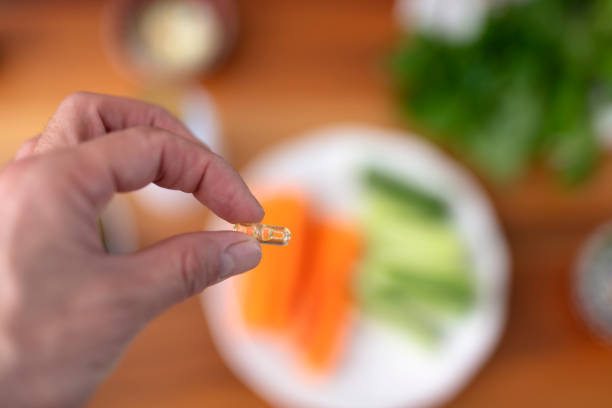Dietary Solutions for Overactive Bladder Relief
Certain foods can help manage an overactive bladder naturally. Incorporating bladder-friendly options like oatmeal, cucumbers, bananas, and lean proteins may reduce irritation. Avoiding triggers like caffeine, citrus, and spicy foods can also support bladder health.

Foods for Overactive Bladder Support
Incorporating bladder-friendly foods into your daily routine can help reduce irritation and promote better urinary control. Whole grains like oatmeal provide steady energy without causing bladder irritation, while their fiber content supports overall digestive health. Lean proteins such as chicken, turkey, and fish offer essential nutrients without the inflammatory compounds found in processed meats.
Fruits like bananas and pears are excellent choices because they’re low in acid and high in potassium, which helps maintain proper fluid balance. Vegetables such as cucumbers, lettuce, and green beans provide hydration and essential vitamins while being gentle on the bladder. Non-acidic herbal teas like chamomile can also contribute to your fluid intake without causing irritation.
What to Eat and Avoid for Overactive Bladder
Creating a balanced approach to eating involves both adding beneficial foods and eliminating potential triggers. Focus on incorporating anti-inflammatory foods like leafy greens, sweet potatoes, and quinoa, which provide nutrients without aggravating bladder symptoms. Probiotic-rich foods such as plain yogurt and kefir support gut health, which can indirectly benefit bladder function.
Foods to avoid include caffeine-containing beverages like coffee, tea, and sodas, as caffeine acts as a diuretic and bladder stimulant. Citrus fruits and juices, while nutritious, contain acids that can irritate the bladder lining. Spicy foods, artificial sweeteners, and carbonated beverages are also common triggers that can worsen overactive bladder symptoms. Alcohol should be limited or avoided entirely, as it can increase urgency and frequency.
Foods That Help Soothe an Overactive Bladder
Certain foods possess natural soothing properties that can calm bladder irritation and reduce symptoms. Magnesium-rich foods like pumpkin seeds, almonds, and spinach help relax muscle tension, including bladder muscles. Complex carbohydrates such as brown rice and whole wheat bread provide sustained energy without causing blood sugar spikes that might affect bladder function.
Water-rich vegetables like zucchini and bell peppers help maintain proper hydration while providing essential vitamins. Incorporating omega-3 fatty acids through sources like salmon and walnuts can reduce inflammation throughout the body, potentially benefiting bladder health. Ginger and turmeric, when used in cooking, offer anti-inflammatory properties that may help soothe irritated tissues.
Many people seeking comprehensive overactive bladder management explore both dietary approaches and professional treatments. Several healthcare providers and specialized clinics offer integrated treatment programs that combine nutritional counseling with medical interventions.
| Provider Type | Services Offered | Treatment Approach | Estimated Cost Range |
|---|---|---|---|
| Urologist Specialists | Medical evaluation, prescription treatments | Clinical medication management | $200-$500 per visit |
| Registered Dietitians | Nutritional counseling, meal planning | Dietary modification programs | $100-$250 per session |
| Integrative Health Centers | Combined medical and nutritional care | Holistic treatment approach | $150-$400 per appointment |
Prices, rates, or cost estimates mentioned in this article are based on the latest available information but may change over time. Independent research is advised before making financial decisions.
Implementation Strategies for Dietary Changes
Successfully managing overactive bladder through diet requires gradual implementation and careful monitoring of your body’s responses. Start by keeping a food and symptom diary to identify your personal triggers, as individual sensitivities can vary significantly. Introduce bladder-friendly foods one at a time to assess their impact on your symptoms.
Meal timing also plays a crucial role in bladder management. Eating smaller, more frequent meals can help maintain stable blood sugar levels and reduce pressure on the bladder. Stay adequately hydrated throughout the day, but consider reducing fluid intake in the evening to minimize nighttime disruptions. Work with healthcare professionals to ensure your dietary changes complement any prescribed treatments.
Long-term Benefits and Considerations
Adopting a bladder-friendly diet offers benefits beyond symptom management, including improved overall health, better digestive function, and reduced inflammation throughout the body. These dietary changes often lead to better sleep quality, increased energy levels, and enhanced general well-being.
Remember that dietary modifications work best as part of a comprehensive treatment approach. While nutrition plays a significant role in managing overactive bladder symptoms, it’s important to maintain regular communication with your healthcare provider about your progress and any concerns that arise during your dietary journey.
This article is for informational purposes only and should not be considered medical advice. Please consult a qualified healthcare professional for personalized guidance and treatment.




